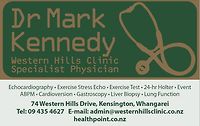Dr Mark Kennedy
Western Hills Clinic
74 Western Hills Drive
Kensington
Whangarei 0112

Dr Mark Kennedy - Private Internal Medicine Specialist

Postal Address
Contact Details
Phone (09) 435 4627, or if URGENT, Linda Clinical Nurse Specialist 021 689 447 outside of clinic hours
Mobile Emergency Phone (021) 702 395
Email admin@westernhillsclinic.co.nz
Healthlink EDI: west74hc
For any urgent Echocardiogram, Exercise Stress Echocardiogram or Exercise Tolerance Test, contact Clinical Nurse Specialist (Linda) on (09) 435 4627 on Tuesday and Thursday (or 021 689 447 outside those days). If she is unavailable and it is URGENT, call Mark Kennedy on (021) 702 395. We can undertake Transthoracic Echocardiograms most weekdays.
Exercise ECG
Patient information:
An ECG undertaken when you are resting may be normal, even when you have coronary artery disease.
An Exercise ECG is the most widely used screening test for cardiac disease and is an important and accurate way of assessing how the heart works when placed under a 'load'. Abnormalities of the heart are frequently recognised in this way. Most new patients, and many patients undergoing a 'follow-up' visit, will undertake an exercise test.
The Exercise ECG is most commonly used to see if you have any evidence of coronary artery disease and can give your doctor some idea as to how severe your coronary artery disease might be.
The Exercise test:
Ten electrodes ('sticky pads') are applied to the chest, and a blood pressure monitor is placed on the arm. For this test you have to walk on a treadmill while your heart is monitored. The test starts at quite a slow pace, comfortable for the specific patient, though the treadmill gets slightly faster and steeper every 3 minutes. You can stop at any time, although the test is usually stopped if anginal pain occurs, any significant ECG changes occur or when an adequate exercise level and heart rate have been reached. This test is supervised by Dr Kennedy and his Cardiac Nurse and is interpreted both during and following the procedure. The ECG and blood pressure are used to monitor the patient during and after the test. The nurse and/or doctor assess the patient and the ECG for evidence of heart problems.
During an exercise ECG the heart is made to work harder so that if there is any narrowing of the coronary arteries resulting in a poor blood supply and oxygen delivery to a region of heart muscle. It is more likely to be picked up on the tracing, as your heart beats more quickly and contracts more vigorously. The test is sometimes used to assess your exercise tolerance and your heart rate response to exercise.
After the test:
An exercise test that is clearly negative after a significant level of exercise is reassuring and indicates good cardiac function.
The exercise test results can be used to direct further investigations and possible treatment.
https://www.healthpoint.co.nz/private/internal-medicine/dr-mark-kennedy-private-internal-medicine/